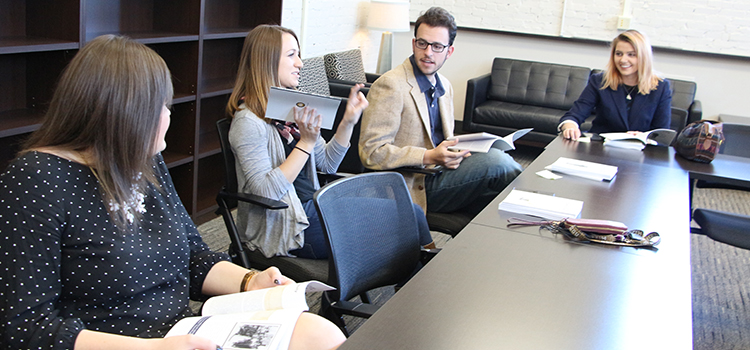Undergraduate
Journal on Constitutional Democracy

Founded in 2014 by inaugural Society of Fellows member Anurag Chandran, the Journal on Constitutional Democracy allows members of each Fellows cohort to gain hands-on experience with the process of creating a scholarly publication. For every volume of the Journal, which is published annually and which students can participate in for course credit, staff members choose a theme adjacent to the Kinder Institute’s focus on political thought, history, and institutions and then research and compose substantive academic articles that explore this theme’s relevance to the development and practice of constitutional democracy in the United States and around the globe. In addition to writing content for the Journal, undergrad staffers are also responsible for overseeing all facets of its production, including content and copyediting, design, and marketing.
Issues
Volume 1, “democracy: within & beyond” (May 2015)
Drawing on a wide range of primary source documents from the American political and intellectual traditions, articles for Volume 1 of the Journal on Constitutional Democracy explore the evolution of the nation’s government from before the American Revolution through the modern day. Essays from Volume 1’s “within” section examine this evolution from a domestic perspective, inquiring into subject matter ranging from the philosophy underlying self-governance to often overlooked aspects of and figures in the history of the women’s suffrage movement. In the Journal’s “beyond” section, students look at how the United States’ democratic origins translated into foreign policy attitudes and initiatives, with a particular focus on the history of the idea of American exceptionalism from John Winthrop to the present.
Volume 2, “rhetoric: from the founding to the present” (May 2016)
The second volume of the Journal tackles the broad theme of rhetoric, tracing the political significance and cultural dimensions of the art of persuasion chronologically, from Jefferson’s “First Inaugural Address” through the rhetoric of the 2016 presidential election, and geographically from Iowa to Scotland. Topics addressed in Volume 2 of the Journal include: mental illness and legislative disenfranchisement in the late-19th and early-20th centuries; the history of the “outsider” in American electoral politics; and the constitutionality of the inclusion of “under God” in the pledge of allegiance.
Volume 3, “But let us begin…” (May 2017)
Drawing its theme from the famous optimism of JFK’s “First Inaugural Address,” Volume 3 of the Journal on Constitutional Democracy explores where national history started, and how we might re-start and reinvigorate political discourse in the United States, through essays on topics and questions ranging from what constitutes a democratic education, to the jurisprudence of Sandra Day O’Connor, and from the evolving purpose of presidential farewell addresses, to the efficacy (and necessity) of FCC regulations.
Volume 4, “Open During Construction” (May 2018)
Reckoning, as a collective, with the way in which things–institutions, literary movements, definitions, and even nations–can simultaneously be functional and in a constant state of flux, staff writers for Volume 4 of the Journal on Constitutional Democracy land upon the conclusion that resolving this seeming contradiction requires starting conversations on everything from the re-appropriation of regressive rhetoric for progressive purposes to pulling the curtain back on the manipulation of message that too often comes with wielding control over its medium.
Versus not in a combative sense, but rather in the sense of multiple voices engaged in productive, often corrective discourse on a wide range of questions. In other words, the essays in Vol. 5 of the Journal on Constitutional Democracy absolutely address problems, and significant ones at that—how do we fix health care? how do we educate a polity? how do we eradicate the lingering vestiges of colonialism?—but they do so with a pen at all times trained toward solutions.
Course Credit
Students can receive up to three hours of course credit for participating in the Journal by taking CNST_DEM 4975 or 4975H, the yearlong course associated with its production and publication. (Note: Though students will enroll under the CNST_DEM designator, the course can still apply to their course of study in History or Political Science.) The course meets for two hours in the fall and one hour in the spring, and all past and present members of our Society of Fellows are eligible to enroll, with seats also open to undergraduates pursuing the B.A. in Constitutional Democracy.
